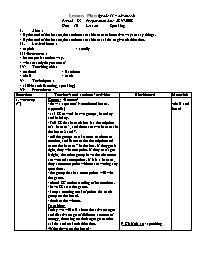Bài soạn môn học Tiếng Anh 11 - Period 83 - Unit: 10 Lesson: Speaking

I. Aims :
- By the end of the lesson, the students are able to use alternative ways to say things.
- By the end of the lesson, the students are able to ask for or give clarification.
II. Lexical items :
- exploit - smelly
III- Structures :
- let me put it another way.
- what exactly do you mean?
IV- Teaching aids:
- textbook - Handouts
- chalk - cards
V- Techniques :
- skill-based ( listening, speaking)
VI- Procedures :
Bạn đang xem tài liệu "Bài soạn môn học Tiếng Anh 11 - Period 83 - Unit: 10 Lesson: Speaking", để tải tài liệu gốc về máy bạn click vào nút DOWNLOAD ở trên
Lesson Plan (grade 11 – advanced) Period : 83 Preparation date :28 /1/2008 Unit : 10 Lesson : Speaking Aims : - By the end of the lesson, the students are able to use alternative ways to say things. - By the end of the lesson, the students are able to ask for or give clarification. Lexical items : - exploit - smelly III- Structures : - let me put it another way. - what exactly do you mean? Teaching aids: - textbook - Handouts - chalk - cards Techniques : - skill-based ( listening, speaking) Procedures : State/time Teacher’s and students’ activities Blackboard Materials 1. warm-up (7’) Games: ‘Banana’ - draw a square of 9 numbered boxes. (appendix) - ask SS to work in two groups, Monkey and Mickey. - Tell SS that in each box is a description of a ‘banana’ , and there are two bananas in the boxes 2 and 7. - tell the groups to take turns to choose a number, and listen to the description and name the ‘banana” in the box. If they get it right, they win one point. If they can’t get it right, the other group have the chance to answer and score points. If it is a banana, they score one point without answering any questions. - the group that has more points will win the game. - check SS’ understanding of instructions. - have SS start the game. - keep a running total of points for each group on the board. - declare the winner. Transition: Today we will talk about the advantanges and disadvantages of different sources of energy, focusing on the language used to ask for and make clarification. -Write down on the board : P 83: Unit 10 : speaking -chalk and board 2. Pre- Speaking (7’) * eliciting and introducing Useful language - elicit from SS questions for clarifaction when they don’t understand something - elicit the structures used to give explanations or clarification for something. - read the example exchange and explain the situation for SS to see how the phrases are used. Useful language: * asking people to clarify: - sorry, I don’t quite understand. - what exactly do you mean? - what does that mean? * saying sth in another way. - I mean . / that means - what I mean is .. Chalk and board Textbook 3. while-Speaking. (20’) 4. Post-Speaking (10’) 5.Homework(1’) Activity 1: Advantages and disadvantages – Information Gap ( task b, p. 145) - pair off SS as A and B - deliver cards A to students A, and cards B to students B ( appendix 2) - ask SS to work in pairs , talking about the advantages and disadvantages of the sources of energy. SS with a gap in the explanation will ask for clarification, and SS with full information will make clarification. - model an example exchange with a student and then have SS so the task. - go around to monitor and note down errors if any for correction late. - call on some close and open pairs to act out their conversations in front of the class. Activity 2: personalization (task c, p.145) - ask SS to work in pairs, talking about the advantages and disadvantages of the cooking fuels and transportation fuels currently used in their home or neighborhood. - act out the example exchange with a student as a model. - have SS start the activity. - go around to monitor and give help with vocabulary or ideals if necessary. - call on some pairs to act out their conversations and invite SS to give comments - give feedback and comments. Listening: -read out mixed expressions of how to do something - SS listen and write down Sentence Making - Ask Sts to make a few sentences about giving instructions Textbook cads textbooks
Tài liệu đính kèm:
 p83.doc
p83.doc





